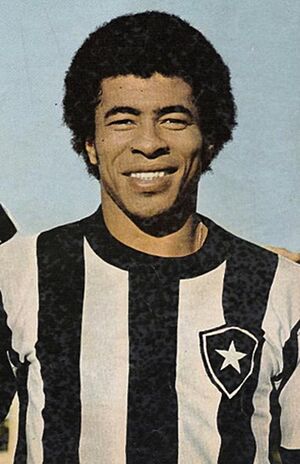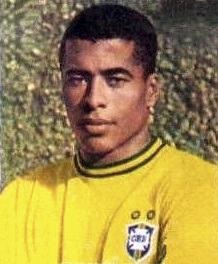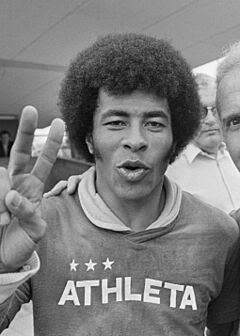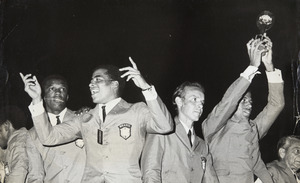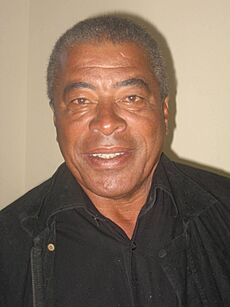Jairzinho facts for kids
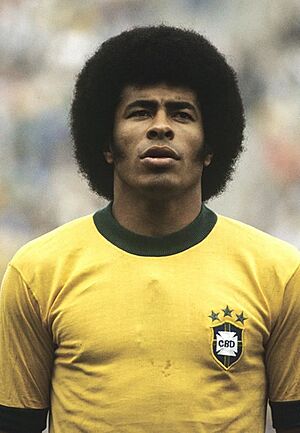
Jairzinho with Brazil in 1974
|
||||||||||||||||||||||
| Personal information | ||||||||||||||||||||||
|---|---|---|---|---|---|---|---|---|---|---|---|---|---|---|---|---|---|---|---|---|---|---|
| Full name | Jair Ventura Filho | |||||||||||||||||||||
| Date of birth | 25 December 1944 | |||||||||||||||||||||
| Place of birth | Rio de Janeiro, Brazil | |||||||||||||||||||||
| Height | 1.73 m (5 ft 8 in) | |||||||||||||||||||||
| Position(s) | Winger, striker | |||||||||||||||||||||
| Youth career | ||||||||||||||||||||||
| 1958–1960 | Botafogo | |||||||||||||||||||||
| Senior career* | ||||||||||||||||||||||
| Years | Team | Apps | (Gls) | |||||||||||||||||||
| 1960–1974 | Botafogo | 416 | (186) | |||||||||||||||||||
| 1974–1975 | Marseille | 18 | (9) | |||||||||||||||||||
| 1975 | Kaizer Chiefs | 3 | (7) | |||||||||||||||||||
| 1976 | Cruzeiro | 24 | (9) | |||||||||||||||||||
| 1977 | Portuguesa (VEN) | 24 | (22) | |||||||||||||||||||
| 1978 | Noroeste | 10 | (4) | |||||||||||||||||||
| 1979 | Fast Clube | 18 | (10) | |||||||||||||||||||
| 1980–1981 | Jorge Wilstermann | 12 | (6) | |||||||||||||||||||
| 1981–1982 | Botafogo | |||||||||||||||||||||
| 1982 | 9 de Octubre | |||||||||||||||||||||
| Total | 525 | (249) | ||||||||||||||||||||
| International career | ||||||||||||||||||||||
| 1963 | Brazil Olympic | 4 | (2) | |||||||||||||||||||
| 1964–1982 | Brazil | 81 | (33) | |||||||||||||||||||
| Managerial career | ||||||||||||||||||||||
| 1987–1988 | Londrina | |||||||||||||||||||||
| 1988–1989 | Al-Wehda | |||||||||||||||||||||
| 1989–1991 | São Cristóvão | |||||||||||||||||||||
| 1995–1996 | Bonsucesso | |||||||||||||||||||||
| 1997–1998 | Kalamata | |||||||||||||||||||||
| 2001–2002 | Mesquita | |||||||||||||||||||||
| 2003–2005 | Gabon | |||||||||||||||||||||
|
Medal record
|
||||||||||||||||||||||
| *Club domestic league appearances and goals | ||||||||||||||||||||||
Jair Ventura Filho (born December 25, 1944), known as Jairzinho, is a famous Brazilian former footballer. He was a quick, skilled, and powerful right winger. Jairzinho was known for his amazing ability to score goals. He was a very important player and top scorer for the legendary Brazil national team that won the 1970 FIFA World Cup.
Jairzinho was nicknamed "the Hurricane" because of how fast he ran down the field. He was a very flexible player who could play in many attacking spots. He could be a main striker, a second striker, or even an attacking midfielder. He was known for his large afro hairstyle later in his career. He also had great speed, dribbling skills, and powerful shots. Many people consider him one of the greatest Brazilian players of all time.
Jairzinho played most of his club football in South America. He spent eleven years with the Rio de Janeiro club Botafogo. He later played in Europe for Olympique de Marseille. Jairzinho took the place of his football hero, Garrincha, in both the Botafogo and Brazil teams. He played in three World Cups: 1966, 1970, and 1974.
Contents
Early Life and Football Start
Jair Ventura Filho was born on December 25, 1944, in Rio de Janeiro, Brazil. His family moved to Rio in the late 1950s. He grew up near the local club Botafogo. He joined their youth teams and started his football journey there.
Club Career Highlights
Playing for Botafogo
Jairzinho began his football career in 1958 at age 13. He was part of the Botafogo youth teams and even worked as a ball boy. He made his first professional appearance for the club in 1960 when he was just fifteen. His idol, Garrincha, also played for Botafogo. Garrincha played in Jairzinho's favorite position, the right wing. Because of this, Jairzinho often played on the left wing or as a centre forward early on. However, he would play as a right winger, his best position, when Garrincha was injured.
By 1965, Jairzinho became a regular player for Botafogo at age 21. He was seen as a rising star across Brazil. Even at this young age, he played alongside famous Brazilian and Botafogo players like Gérson, Mario Zagallo, and Garrincha.
In 1968, Botafogo won two major Brazilian titles. They won the 1968 Campeonato Carioca and the Taça Guanabara. Jairzinho scored 9 goals in 11 games in the Taça Guanabara. By this time, Garrincha had left Botafogo, allowing Jairzinho to play in his natural right wing position. Botafogo then won a third trophy that year, the 1968 Campeonato Brasileiro Série A. In the 1969 Campeonato Carioca season, he scored 7 goals. Just before the 1970 World Cup, Jairzinho was Botafogo's top scorer with 9 goals in the 1970 Campeonato Carioca.
After his amazing performance at the 1970 FIFA World Cup in Mexico, more people around the world watched his Botafogo team. In his last four years at Botafogo, he became one of the club's top goal scorers. He scored 186 goals in 416 games, which is about 0.45 goals per game. He is the 6th highest goal scorer in Botafogo's history. One of his best games was in 1972 when he scored three goals against Flamengo in a famous 6–0 win. This was one of Botafogo's most memorable victories. In the same year, he won the Bronze Award for the South American Footballer of the Year.
Moving to Europe: Marseille
In 1974, Jairzinho moved to the French club Olympique de Marseille. This was a very expensive transfer at the time. He joined his Botafogo and Brazil teammate Paulo Cézar Caju there.
Jairzinho was welcomed like a superstar by the Marseille fans. The day before his first game, over 10,000 fans came to watch him train. Jairzinho scored in his first game against AS Monaco, helping his team win 4–1. He was seen as a top-class winger who would do great things in European football.
Jairzinho scored 9 goals in just 18 league games. He also had a great performance against FC Nantes in the Coupe de France, scoring 2 goals in a 4–0 win. However, his time in France ended early. He and Caju were suspended for one year after an incident involving officials during a game. Because of this, he left the club in the summer of 1975.
Playing in South Africa and Brazil
After leaving Marseille, Jairzinho played a few games for Kaizer Chiefs in South Africa. He said he enjoyed the warm welcome and how he was "treated like a king." He scored 7 goals in only 3 league games during his short time there.
In 1976, Jairzinho returned to Brazil and joined Cruzeiro. He quickly showed he was still a world-class player. He scored 31 goals in 43 games across all competitions. He was the second-highest goal scorer in the 1976 Copa Libertadores with 12 goals. He also helped Cruzeiro win the Copa Libertadores trophy, which was the first for the club. Cruzeiro then played against Bayern Munich in the 1976 Intercontinental Cup but lost. Jairzinho only spent one year at Cruzeiro, but it was a very successful period.
Later Career
In 1977, at age 32, Jairzinho surprised many by joining the Venezuelan team Portuguesa. He helped Portuguesa become one of the best teams in Venezuelan history. They won a record 16 games in a row and their fourth of five championships. He scored 22 league goals in 24 games, including three games where he scored three goals.
Later in his career, Jairzinho had short spells at other Brazilian clubs. He played for Noroeste in 1978, scoring 10 goals. A year later, he joined Fast Clube and scored another 10 goals. In 1980, at age 35, Jairzinho signed with the Bolivian team Club Deportivo Jorge Wilstermann, scoring 6 goals. In 1981, Jairzinho returned to Botafogo for his final season. He was seen as an idol by the younger players. He scored one goal in a friendly match that year.
International Career with Brazil
Jairzinho first played for the Brazilian national team in 1964 when he was 19. This happened when Garrincha was injured. He played in the 1966 FIFA World Cup in England. However, with Garrincha back, Jairzinho played as a left winger. He found it hard to play well in this position, especially at his young age. Brazil was eliminated early from the tournament. After the World Cup, Garrincha retired from international football. This allowed Jairzinho to finally take over his idol's role on the right wing for Brazil. Jairzinho scored 2 goals in the 6 qualifying matches for the 1970 World Cup.
In his favorite position, Jairzinho became a much better player for his country. At the 1970 FIFA World Cup in Mexico, Jairzinho was one of the tournament's biggest stars. He made history by scoring in every single game Brazil played. Because of this, he earned the nickname "Furacão da Copa" (World Cup Hurricane). His second goal against Czechoslovakia was one of the best goals of the tournament. He made an incredible solo run, getting past four players, and then hit a powerful shot into the goal. This is still remembered as one of the most famous goals in World Cup history.
He scored his seventh goal of the tournament in Brazil's 4–1 World Cup win over Italy in the final. Even with his many goals, he did not win the World Cup Golden Boot, which went to Germany's Gerd Müller, who scored ten goals.
Jairzinho scored two goals in the 1974 FIFA World Cup. This was his last World Cup for Brazil. The third-place final was his last official match for Brazil. He later played one farewell game against Czechoslovakia on March 3, 1982, which ended in a 1–1 draw. He scored 33 goals in 81 games during his international career.
Jairzinho's Playing Style
Jairzinho was known as a versatile forward who could create danger and score from anywhere on the field. He had incredible speed and quick bursts of acceleration. He also had an excellent first touch and great dribbling skills. However, Jairzinho's most special quality was his strength.
Often, opposing teams would try to put two defenders on Jairzinho to stop him. But he was a hard-working team player who would also track back to defend. He used his strong body to stop opponents' attacks.
Jairzinho's movement without the ball was a key reason he scored so many goals. In the 1970 FIFA World Cup, he showed his attacking smarts. His goal against England helped Brazil win. He made a smart run after Pelé and then hit a powerful shot into the top corner. This showed his goal-scoring threat and overall intelligence on the field.
Many coaches and teammates praised his finishing ability. The timing, accuracy, and power of Jairzinho's shots were almost perfect. This made it very hard for goalkeepers to stop them. He could also shoot powerfully and accurately with his left foot, making him a complete forward.
Besides his effective attacking play, Jairzinho had many talents with the ball. Many people called his technical ability "phenomenal." One of his signature moves was flicking the ball up from a pass inside the opponent's box. He would then perfectly cushion the ball for an open shot. He also had smart creativity. A great example is the cross he made for Pelé against England, which led to the famous save by Gordon Banks. Some people believe Jairzinho is one of the most complete forwards of all time.
Managerial Career
After he stopped playing football, Jairzinho became a coach. He managed many youth teams in Brazil. He also worked in Japan, Saudi Arabia, and the United Arab Emirates. In 1997, Jairzinho started coaching in Europe for the Greek club Kalamata. He was let go because of poor results, and his team was moved to a lower league at the end of the season. Jairzinho was later named head coach of the Gabon national team. However, he was removed from his position after a big loss against Angola in a World Cup qualifier.
Perhaps his greatest success as a coach was discovering Ronaldo when Ronaldo was 14 years old. Jairzinho was coaching São Cristóvão at the time. He helped start Ronaldo's career by recommending him to Cruzeiro, his former club, and to the Brazil youth team. Ronaldo later became a three-time FIFA World Player of the Year.
Personal Life
Jairzinho's son, Jair Ventura, also played football. He later became a manager for clubs like Corinthians, Botafogo, and Santos.
Honours and Awards
Jairzinho won many titles and awards during his career.
Club Trophies
Botafogo
- Brazilian Championship: 1968
- Rio de Janeiro State Championship: 1961, 1962, 1967, 1968
- Torneio Rio – São Paulo: 1964, 1966
- Torneio de Caracas: 1967, 1968, 1970
Cruzeiro
- Minas Gerais State Championship: 1975
- Copa Libertadores: 1976
Jorge Wilstermann
- Bolivian League: 1980, 1981
International Trophies with Brazil
Brazil
- FIFA World Cup: 1970
- Pan American Games: 1963
- Independence Cup: 1972
Individual Awards
- FIFA World Cup Silver Boot: 1970
- FIFA World Cup All-Star Team: 1970
- World XI: 1971, 1972
- South American Player of the Year: Bronze award 1972
- World Soccer: 27th Greatest Player of the 20th Century
- IFFHS Brazilian Player of the 20th Century (19th place)
- Brazilian Football Museum Hall of Fame
See also
 In Spanish: Jairzinho para niños
In Spanish: Jairzinho para niños
 | William Lucy |
 | Charles Hayes |
 | Cleveland Robinson |


